5 books about Hardin, Russell
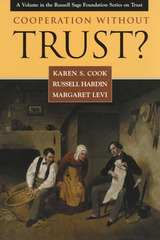
Cooperation Without Trust?
Karen S. Cook
Russell Sage Foundation, 2005
Some social theorists claim that trust is necessary for the smooth functioning of a democratic society. Yet many recent surveys suggest that trust is on the wane in the United States. Does this foreshadow trouble for the nation? In Cooperation Without Trust? Karen Cook, Russell Hardin, and Margaret Levi argue that a society can function well in the absence of trust. Though trust is a useful element in many kinds of relationships, they contend that mutually beneficial cooperative relationships can take place without it. Cooperation Without Trust? employs a wide range of examples illustrating how parties use mechanisms other than trust to secure cooperation. Concerns about one's reputation, for example, could keep a person in a small community from breaching agreements. State enforcement of contracts ensures that business partners need not trust one another in order to trade. Similarly, monitoring worker behavior permits an employer to vest great responsibility in an employee without necessarily trusting that person. Cook, Hardin, and Levi discuss other mechanisms for facilitating cooperation absent trust, such as the self-regulation of professional societies, management compensation schemes, and social capital networks. In fact, the authors argue that a lack of trust—or even outright distrust—may in many circumstances be more beneficial in creating cooperation. Lack of trust motivates people to reduce risks and establish institutions that promote cooperation. A stout distrust of government prompted America's founding fathers to establish a system in which leaders are highly accountable to their constituents, and in which checks and balances keep the behavior of government officials in line with the public will. Such institutional mechanisms are generally more dependable in securing cooperation than simple faith in the trustworthiness of others. Cooperation Without Trust? suggests that trust may be a complement to governing institutions, not a substitute for them. Whether or not the decline in trust documented by social surveys actually indicates an erosion of trust in everyday situations, this book argues that society is not in peril. Even if we were a less trusting society, that would not mean we are a less functional one. A Volume in the Russell Sage Foundation Series on Trust
[more]
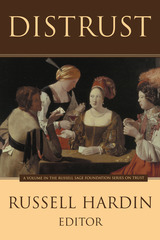
Distrust
Russell Hardin
Russell Sage Foundation, 2004
If trust is sometimes the rational response in interpersonal relations, then it can also be rational to distrust. Indeed, distrust is the preferred response when it protects against harm—as when parents do not entrust the safety of their child to a disreputable caretaker. Liberal political theory was largely founded on distrust of government, and the assumption that government cannot and should not be trusted led the framers of the U.S. constitution to establish a set of institutions explicitly designed to limit government power. With contributions from political science, anthropology, economics, psychology, and philosophy, Distrust examines the complex workings of trust and distrust in personal relationships, groups, and international settings. Edna Ullman-Margalit succinctly defines distrust as the negation of trust, and examines the neutral state between the two responses in interpersonal relations. As Margalit points out, people typically defer judgment—while remaining mildly wary of another's intentions—until specific grounds for trust or distrust become evident. In relations between nations, misplaced trust can lead to grievous harm, so nations may be inclined to act as though they distrust other nations more than they actually do. Editor Russell Hardin observes that the United States and the former Soviet Union secured a kind of institutionalized distrust—through the development of the nuclear deterrent system—that stabilized the relationship between the two countries for four decades. In another realm where distrust plays a prominent role, Margaret Levi, Matthew Moe, and Theresa Buckley show that since the National Labor Relations Board has not been able to overcome distrust between labor unions and employers, it strives to equalize the power held by each group in negotiations. Recapitulating liberal concerns about state power, Patrick Troy argues that citizen distrust keeps government regulation under scrutiny and is more beneficial to the public than unconditional trust. Despite the diversity of contexts examined, the contributors reach remarkably similar conclusions about the important role of trust and distrust in relations between individuals, nations, and citizens and their governments. Distrust makes a significant contribution to the growing field of trust studies and provides a useful guide for further research. A Volume in the Russell Sage Foundation Series on Trust
[more]
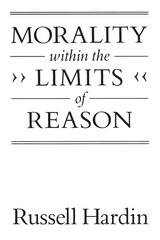
Morality within the Limits of Reason
Russell Hardin
University of Chicago Press, 1988
This provocative, lucidly written reconstruction of utilitarianism focuses on the practical constraints involved in ethical choice: information may be inadequate, and understanding of causes and effects may be limited. Good decision making may be especially constrained if other people are closely involved in determining an outcome. Hardin demonstrates that many of these structural issues can and should be distinguished from the thornier problems of utilitarian value theory, and he is able to show what kinds of moral conclusions we can reach within the limits of reason.
[more]
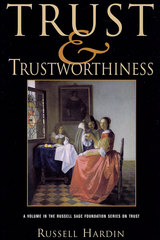
Trust and Trustworthiness
Russell Hardin
Russell Sage Foundation, 2002
What does it mean to "trust?" What makes us feel secure enough to place our confidence—even at times our welfare—in the hands of other people? Is it possible to "trust" an institution? What exactly do people mean when they claim to "distrust" their governments? As difficult as it may be to define, trust is essential to the formation and maintenance of a civil society. In Trust and Trustworthiness political scientist Russell Hardin addresses the standard theories of trust and articulates his own new and compelling idea: that much of what we call trust can be best described as "encapsulated interest." Research into the roles of trust in our society has offered a broad range of often conflicting theories. Some theorists maintain that trust is a social virtue that cannot be reduced to strategic self-interest; others claim that trusting another person is ultimately a rational calculation based on information about that person and his or her incentives and motivations. Hardin argues that we place our trust in persons whom we believe to have strong reasons to act in our best interests. He claims that we are correct when we assume that the main incentive of those whom we trust is to maintain a relationship with us—whether it be for reasons of economic benefit or for love and friendship. Hardin articulates his theory using examples from a broad array of personal and social relationships, paying particular attention to explanations of the development of trusting relationships. He also examines trustworthiness and seeks to understand why people may behave in ways that violate their own self-interest in order to honor commitments they have made to others. The book also draws important distinctions between vernacular uses of "trust" and "trustworthiness," contrasting, for example, the type of trust (or distrust) we place in individuals with the trust we place in institutions Trust and Trustworthiness represents the culmination of important new research into the roles of trust in our society; it offers a challenging new voice in the current discourse about the origins of cooperative behavior and its consequences for social and civic life. A Volume in the Russell Sage Foundation Series on Trust
[more]
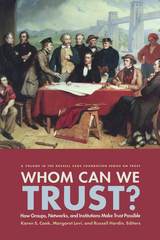
Whom Can We Trust?
How Groups, Networks, and Institutions Make Trust Possible
Karen S. Cook
Russell Sage Foundation, 2009
Conventional wisdom holds that trust is essential for cooperation between individuals and institutions—such as community organizations, banks, and local governments. Not necessarily so, according to editors Karen Cook, Margaret Levi, and Russell Hardin. Cooperation thrives under a variety of circum-stances. Whom Can We Trust? examines the conditions that promote or constrain trust and advances our understanding of how cooperation really works. From interpersonal and intergroup relations to large-scale organizations, Whom Can We Trust? uses empirical research to show that the need for trust and trustworthiness as prerequisites to cooperation varies widely. Part I addresses the sources of group-based trust. One chapter focuses on the assumption—versus the reality—of trust among coethnics in Uganda. Another examines the effects of social-network position on trust and trustworthiness in urban Ghana and rural Kenya. And a third demonstrates how cooperation evolves in groups where reciprocity is the social norm. Part II asks whether there is a causal relationship between institutions and feelings of trust in individuals. What does—and doesn't—promote trust between doctors and patients in a managed-care setting? How do poverty and mistrust figure into the relations between inner city residents and their local leaders? Part III reveals how institutions and networks create environments for trust and cooperation. Chapters in this section look at trust as credit-worthiness and the history of borrowing and lending in the Anglo-American commercial world; the influence of the perceived legitimacy of local courts in the Philippines on the trust relations between citizens and the government; and the key role of skepticism, not necessarily trust, in a well-developed democratic society. Whom Can We Trust? unravels the intertwined functions of trust and cooperation in diverse cultural, economic, and social settings. The book provides a bold new way of thinking about how trust develops, the real limitations of trust, and when trust may not even be necessary for forging cooperation. A Volume in the Russell Sage Foundation Series on Trust
[more]
READERS
Browse our collection.
PUBLISHERS
See BiblioVault's publisher services.
STUDENT SERVICES
Files for college accessibility offices.
UChicago Accessibility Resources
home | accessibility | search | about | contact us
BiblioVault ® 2001 - 2024
The University of Chicago Press









